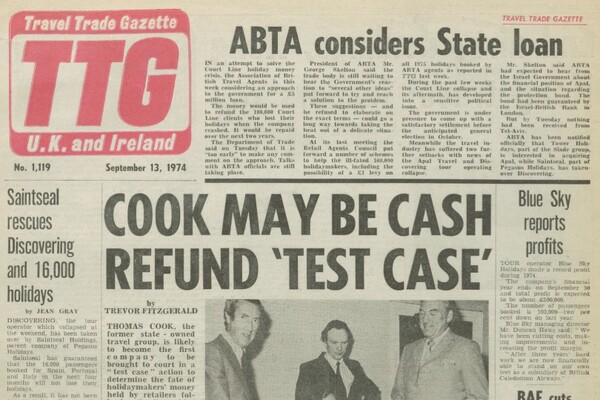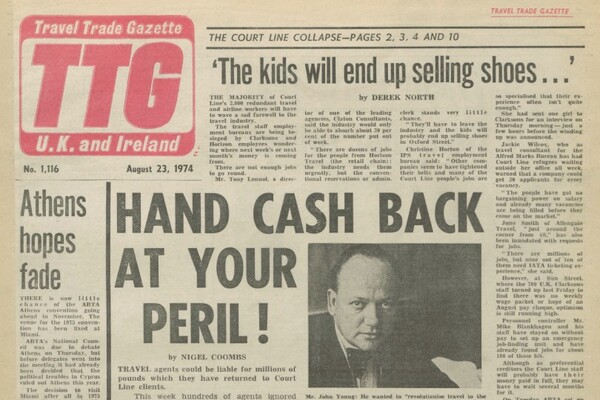Court Line at 50: how travel's then biggest failure shaped its future for the better
 Dave Richardson
Dave RichardsonCourt Line’s failure 50 years ago changed travel’s trajectory for ever – this month, Dave Richardson explores the lessons the industry and the trade learnt.
Fifty years ago this month, the trade was hit by what was then the biggest financial collapse in its history when Court Line – including its tour operating brands Clarksons and Horizon – went bust.
The shockwaves reached the heart of government and led to more robust consumer protection being put in place for when other big collapses happened, the benefits of which are still being felt by holidaymakers today.
Clarksons pioneered cheap package holidays in the 1960s, whereas Horizon – often considered to be the first package holiday operator in 1950 – took a more quality approach.
By the early 1970s, Clarksons had carried one million passengers and become the top operator, an accolade coveted by the recently formed Thomson Holidays (now Tui UK).
Industry instability
But its margins were very thin and in April 1973, after racking up huge losses, it was acquired by Court Line – an international conglomerate that operated a charter airline, a Caribbean airline and hotels in Saint Lucia and Antigua, and had other interests including shipbuilding.
Economic conditions were very tough going into 1974, with oil prices rocketing after the Yom Kippur Arab-Israel war of October 1973. Inflation was rampant and waves of strikes paralysed the economy, leading to power outages and a three-day working week.
In a then unprecedented move, Court Line introduced two 400-seat TriStars joining 11 much smaller BAC 1-11s, flying them to the Caribbean and Europe. Horizon was acquired by Court Line in January 1974.
But rumours about Court Line’s precarious financial position wouldn’t go away and, after much talking behind the scenes, the government declared it insolvent at 4pm on 15 August.
Stewart Wild, Clarksons’ tours manager at that time, recalls: “Things hadn’t been good for two years since Tom Gullick, who built up the company, resigned in protest after being told to raise prices.
"Morale in my area was pretty good, but we didn’t really know what was going on at director level. We were expecting a restructure rather than being closed down, and we were getting flak about unfinished hotels and poor-quality cruise ships.
“Tom was very popular, but financial control wasn’t strong. New bosses were brought in, but Clarksons had lost its heart and soul. We went home as normal that day and the first I heard of the collapse was on the nine o’clock news. It was all over the papers the next morning, but some people didn’t find out until they turned up for work.”
Wild is organising a final reunion of former Clarksons staff in London on 7 September with about 40 due to attend – proof, he says, of the affection and loyalty people still feel towards the company.
’Chaos and panic’
About 3,000 people worldwide, including 700 at Clarksons’ office in London’s Sun Street, lost their jobs. Court Line collapsed at the height of the holiday season when financial protection was in its infancy, and the trade’s credibility was on the line.
The Civil Aviation Authority was set up in 1972 with the Atol scheme following in 1973, but Clarksons’ bond was held by the Tour Operators Study Group (TOSG), which later merged with Abta.
TOSG took the leading role in rescuing people stranded abroad, as hotels which hadn’t been paid were threatening to turn people out or seize their luggage. Clarksons’ bond of more than £3 million was nowhere near enough to bring home the 35,000 customers abroad and refund the 100,000 with advance bookings.

Nigel Coombs, a TTG reporter who covered the collapse and later became TTG’s editor, says: “There was panic in the government.
"At that time, people were not used to travelling abroad. Many bought the cheapest, which meant Clarksons. Its profit margins were minuscule, as low as £1 per head, and they had old and unreliable 1-11s. The collapse caused utter chaos.”
Agents bore the brunt of customers’ anger, many refunding money they had been paid for Clarksons holidays despite warnings they could face legal action from Court Line’s liquidator.
Cliff Jones, a member of Abta’s Retail Agents Council at the time, ran the C&V Jones agency in Eccles, near Manchester. “Chaos reigned supreme at Abta HQ,” he recalls. “The government wanted Abta to foot the shortfall, but eventually agreed to indemnify tour operators to pay off hoteliers and repatriation costs.
“We felt the Tour Operators Council had a responsibility to monitor their members and it was pretty clear to everyone that Clarksons in particular had been behaving irresponsibly.
“My wife, Val, and my senior clerk, Keith Crook, bore the brunt of it. Their overwhelming memory is one of panic and 12-hour days, rooting out clients’ files in preparation for claims and rebooking.”

Tour operators and airlines got together to bring customers home in the glare of an often hostile media. The situation was only resolved when the government, which had made a statement in the House of Commons to reassure customers before the collapse, agreed a bail-out.
It set up the Air Travel Reserve Fund – now the Air Travel Trust – with a £15 million loan, recouped by a levy of 1% or 2% on all package holidays sold for the next few years.
Financial protection was gradually tightened, with the CAA later taking over all bonding of air tour operators from TOSG and Abta. The Atol scheme was eventually extended to some flight-only bookings and tailor-made holidays, with the £2.50 levy now paid by each customer feeding the Air Travel Trust.
As a result there has never been a repeat of the chaos of August 1974, despite the significant collapses that were to follow – including those of XL Leisure Group and Thomas Cook.
With Clarksons’ demise, Thomson Holidays – acquired by Tui in 2000 and rebranded as Tui UK in 2017 – became the UK’s biggest tour operator, a position it held until October 2023 when it was overtaken by Jet2holidays.
The legacy of Court Line, though, lives on in the protections now afforded to travellers via the Atol scheme and many of the learnings from taken from the demise of a giant.
Dave Richardson joined TTG in 1974, becoming a reporter and later a freelance feature writer. He is author of Let’s Go – a History of Package Holidays and Escorted Tours (historyofpackagetours.co.uk).
TTG at 70: Opening up the archives
During our 70th anniversary year (2023), TTG charted the history of the travel industry through a series of special features delving into the magazine's 70-year back catalogue, all of which is archived on the TTG Media website. Here is the story so far:
- How travel took on the Covid crisis – and won
- The long journey to package holiday perfection
- How travel agents have stood the test of time
- The extraordinary rise of the cruise industry
- Aviation's highs and lows through the ages
- The ash cloud, the rise of cruise – and the death of an institution
- How – and why – terror changed travel forever
- The 90s – the decade that just about saw it all
- How travel's boom-bust nature came to be
- The 'big bang' that made travel affordable for all
- All hail the package in the Swinging Sixties
- The rise of mass travel, and where it all began
Sign up for weekday travel news and analysis straight to your inbox

Dave Richardson
Supplier Directory
Find contacts for 260+ travel suppliers. Type name, company or destination.













